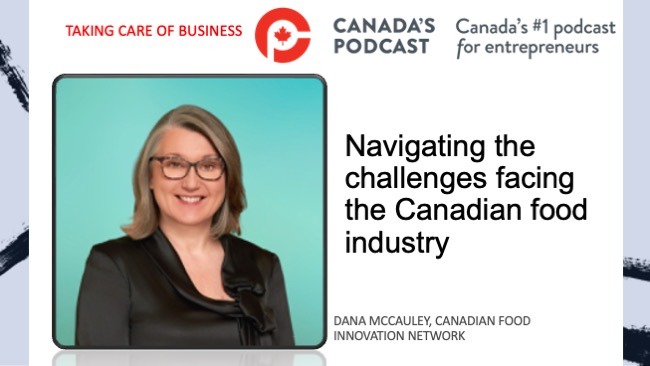Keyli Loeppky, Director of Alberta and Interprovincial Affairs for the Canadian Federation of Independent Business, discusses a new report on the impact internal trade barriers are having for the Canadian economy.
The video interview can also be seen here.

Keyli Loeppky
PRESS RELEASE
Toronto, July 23, 2024 – Canada’s productivity is lagging behind its G7 counterparts, and one in two small businesses say interprovincial trade barriers are part of the problem, according to the Canadian Federation of Independent Business (CFIB)’s latest State of Internal Trade report: Interprovincial Cooperation Report Card. CFIB is urging all levels of governments to take decisive action to eliminate internal trade barriers.
“Recent research has found that eliminating internal trade barriers could add $200 billion annually to Canada’s economy,” said Keyli Loeppky, Director of Alberta and Interprovincial Affairs for CFIB. “Amid soaring business costs, inflationary pressures, high interest rates, and persistent labour shortages, the need to remove barriers is more urgent than ever. Doing so will expand choices for goods and services, secure supply chains, and make life more affordable for all Canadians.”
This year’s report card evaluates governments on their progress in three key areas: exceptions to the Canadian Free Trade Agreement (CFTA), select barriers to internal trade, and the implementation status of reconciliation agreements. Additionally, a new bonus indicator has also been added this year to measure government leadership in the past year in areas beyond these categories. Overall grades range from disappointing Ds to commendable Bs and just one A-, with some individual area grades being higher.
| Jurisdiction | I. Canadian Free Trade Agreement Exceptions (40%) | II. Select Barriers to Internal Trade (20%) | III. Status of Items from Reconciliation Agreements (40%) | Bonus Indicator: Internal Trade Leadership (2%) | Overall Score and Grade | ||||
|---|---|---|---|---|---|---|---|---|---|
| MB | 9.4 | A | 5.4 | D | 9.6 | A | 0 | 8.7 | A- |
| AB | 10.0 | A | 4.0 | D | 9.5 | A | 0 | 8.6 | B+ |
| FED3 | 7.1 | C+ | 8.7 | A- | 10 | 8.1 | B | ||
| SK | 7.8 | B | 5.3 | D | 9.2 | A | 10 | 8.0 | B |
| BC | 8.1 | B | 4.1 | D | 9.2 | A | 10 | 7.9 | B |
| ON | 6.5 | C- | 5.6 | D | 8.2 | B | 10 | 7.2 | C+ |
| NU | 6.8 | C | 2.0 | F | 8.6 | B+ | 10 | 6.8 | C |
| NT | 7.1 | C+ | 2.0 | F | 8.3 | B | 10 | 6.8 | C |
| NS | 4.7 | D | 5.1 | D | 8.6 | B+ | 10 | 6.6 | C |
| NL | 6.4 | C- | 2.0 | F | 7.7 | B- | 10 | 6.2 | C- |
| PEI | 5.4 | D | 2.9 | F | 7.9 | B | 5 | 6.0 | C- |
| YT | 4.1 | D | 3.0 | F | 8.8 | A- | 10 | 5.9 | D |
| NB | 3.8 | F | 2.9 | F | 8.1 | B | 5 | 5.4 | D |
| QC | 0.0 | F | 3.6 | F | 8.9 | A- | 0 | 4.3 | D |
“Despite some positive steps, including the federal government’s recent efforts to reduce trade barriers and enhance data availability, the launch of the RCT’s online portal for Canadians to identify regulatory barriers, and the Atlantic provinces’ new Technical Safety Agreement, overall progress has been minimal,” noted Jairo Yunis, Director for BC and Western Economic Policy for CFIB.
CFIB strongly recommends governments across Canada move quickly to adopt mutual recognition. This means, for example, that if a business meets health and safety standards in their home province, those standards should be recognized by any other province or territory.
“Why is it easier and cheaper to export food to neighbouring countries than to neighbouring provinces or territories? We need to put ourselves out there and compete with the rest of the world instead of competing amongst ourselves,” concluded Loeppky. “Governments owe it to Canadians, who are currently undergoing an affordability crisis, to aim higher than mediocrity. To do this, governments must remove barriers and move forward with mutual recognition.”
For more information, read CFIB’s full Canada’s Interprovincial Cooperation Report Card.
About CFIB
The Canadian Federation of Independent Business (CFIB) is Canada’s largest association of small and medium-sized businesses with 97,000 members across every industry and region. CFIB is dedicated to increasing business owners’ chances of success by driving policy change at all levels of government, providing expert advice and tools, and negotiating exclusive savings. Learn more at cfib.ca.

Mario Toneguzzi
Mario Toneguzzi is Managing Editor of Canada’s Podcast. He has more than 40 years of experience as a daily newspaper writer, columnist, and editor. He was named in 2021 as one of the Top 10 Business Journalists in the World by PR News – the only Canadian to make the list. He was also named by RETHINK to its global list of Top Retail Experts 2024.
About Us
Canada’s Podcast is the number one podcast in Canada for entrepreneurs and business owners. Established in 2016, the podcast network has interviewed over 600 Canadian entrepreneurs from coast-to-coast.
With hosts in each province, entrepreneurs have a local and national format to tell their stories, talk about their journey and provide inspiration for anyone starting their entrepreneurial journey and well- established founders.
The commitment to a grass roots approach has built a loyal audience on all our social channels and YouTube – 500,000+ lifetime YouTube views, 200,000 + audio downloads, 35,000 + average monthly social impressions, 10,000 + engaged social followers and 35,000 newsletter subscribers. Canada’s Podcast is proud to provide a local, national and international presence for Canadian entrepreneurs to build their brand and tell their story





